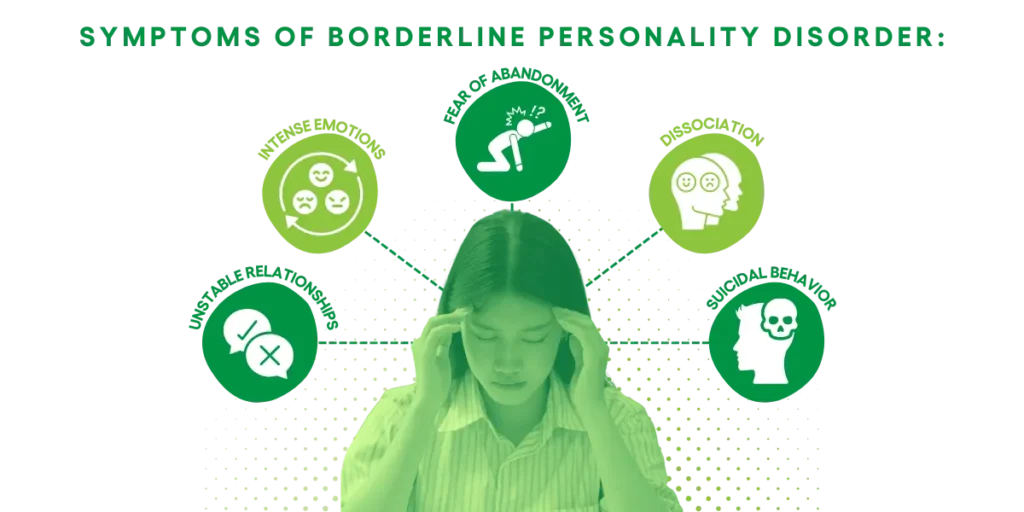Celebrities are not immune to mental health disorders, and it is possible the limelight only exacerbates the symptoms.

In the United States, approximately 1.4% of the adult population experiences borderline personality disorder (BPD) – nearly 75% of those are women.
Considered a severe mental disorder, BPD is associated with a person’s inability to manage their emotions effectively. Unfortunately, BPD is often misdiagnosed as post-traumatic stress disorder (PTSD) or depression.
BPD does not discriminate – even the celebrities we idolize can suffer from mental health disorders. There is a stigma associated with these disorders, including Borderline Personality Disorder, but in recent years transparency about mental health has become more common thanks to celebrities opening up and discussing their struggles with the public.
What is Borderline Personality Disorder?
Borderline personality disorder is a mental health disorder characterized by pervasive patterns of instability in interpersonal relationships, self-image, emotions, and impulsivity.
People with BPD often experience intense mood swings, difficulty regulating emotions, and have a distorted self-image. They may also engage in impulsive behaviors such as substance abuse, reckless driving, binge eating, or self-harm.

Common symptoms of BPD include:
- Fear of abandonment: People with BPD often have an intense fear of being abandoned by loved ones. They may go to great lengths to avoid real or imagined abandonment, which can lead to clingy or dependent behavior in relationships.
- Unstable relationships: Individuals with BPD often struggle to maintain stable and healthy relationships. They may have a pattern of idealizing others one moment and then devaluing them the next, resulting in turbulent and chaotic interpersonal dynamics.
- Unstable self-image: People with BPD may have a distorted or unstable sense of self. They may struggle with self-identity and have difficulty understanding their own values, goals, or beliefs. This can lead to frequent changes in goals, career paths, or personal values.
- Impulsive behavior: Impulsivity is a common trait in individuals with BPD. This can manifest in various ways, such as reckless driving, substance abuse, binge eating, reckless spending, or engaging in risky sexual behavior.
- Intense emotions: People with BPD often experience emotions with great intensity and fluctuation. They may have difficulty regulating their emotions and may react strongly to seemingly minor triggers. Episodes of intense anger, sadness, anxiety, or irritability are common.
- Chronic feelings of emptiness: Individuals with BPD may experience a persistent sense of emptiness or inner void. They may feel like something is missing in their lives and struggle to find fulfillment or satisfaction, even when engaging in enjoyable activities.
- Dissociation: Some individuals with BPD may experience dissociative symptoms, such as feeling disconnected from their thoughts, feelings, or surroundings. They may have episodes of depersonalization (feeling detached from oneself) or derealization (feeling detached from reality).
- Intense and unstable relationships: People with BPD often have tumultuous relationships marked by frequent conflicts, dramatic mood swings, and difficulties with trust and intimacy.
- Suicidal behavior or self-harm: Individuals with BPD have a higher risk of engaging in suicidal behavior or self-harming acts, especially during periods of extreme emotional distress. This can include cutting, burning, or other forms of self-injury.
Celebrities with Borderline Personality Disorder
The causes of BPD are not fully understood, but a combination of factors may be responsible for the disorder. These factors may include genetics, environmental factors, and a person’s brain function. Medical and psychiatric professionals will look at the symptoms and conduct a thorough medical assessment before making a BPD diagnosis.
Celebrities are not immune to mental health disorders. It is hypothesized that the limelight might exasperate their symptoms, due to the stress that stardom inflicts on the mind and body.
There are several celebrities with borderline personality disorder – some you might already know about due to their transparency about their diagnosis, and others you may not have realized live with BPD.

Jim Carrey
Best known for his comedic performances, Jim Carrey has openly talked about his struggles with depression. It is believed that his traumatic childhood, which has left him with deep emotional scars, may be what have contributed to his BPD and affected his personal relationships. He uses painting and art to handle his borderline personality disorder symptoms.

Britney Spears
Although it has not been publicly confirmed, former teen singing sensation Britney Spears has exhibited many BPD symptoms over the years. Her excessive anger, mood swings, reckless behavior, substance abuse, and public mental breakdown supports the possibility that Spears may have borderline personality disorder. Her display of mental health symptoms also found her with a conservatorship.

Angelina Jolie
In the 1990s, Angelina Jolie was diagnosed with BPD. She had a history of self-injury in her younger years, as well as volatile relationships, sexual confusion, eating disorders, and more as she entered adulthood. Now, a more stable adult, Jolie has committed herself to working with refugees and promoting humanitarian causes – showing that she has grown more stable and is managing her borderline personality disorder responsibly.

Brandon Marshall
For NFL wide receiver Brandon Marshall, being a sports star was not the only thing that contributed to his relationship failures and mental health issues. Marshall has become a figurehead for mental health issues since his BPD diagnosis. He uses his public position to educate and create awareness about borderline personality disorder.

Marilyn Monroe
Over the course of Marilyn Monroe’s life, she showed signs of BPD – depression, suicide attempts, mental institution stays, and abandonment issues. Although highly successful, Monroe had a history of substance abuse, failed relationships, and erratic behavior, all confirming signs of borderline personality disorder. She struggled with mental health and self-image issues up to her barbiturate overdose at the age of 36.

Carrie Fisher
Carrie Fisher, best known for her role as Princess Leia in the Star Wars franchise, was diagnosed with BPD at the age of 24. The actress refused to acknowledge her mental illness diagnosis – until she experienced a drug overdose at the age of 28. Wanting to get better for her daughter, Fisher began treatment, acknowledging her BPD which was the result of a traumatic childhood.
Help for Borderline Personality Disorder
Treatment for borderline personality disorder begins by reaching out to a healthcare provider to obtain a diagnosis.
The provider will conduct a thorough evaluation to determine if BPD is present and then create a treatment plan that meets the individual’s unique needs.
Seeing that celebrities with borderline personality disorder can excel, or succumb, to their mental illness can help individuals who have been diagnosed understand that there are ways of coping with BPD – living with the diagnosis, not being defined by their diagnosis.










